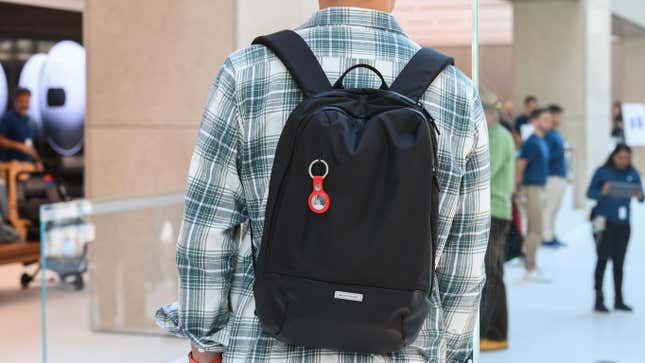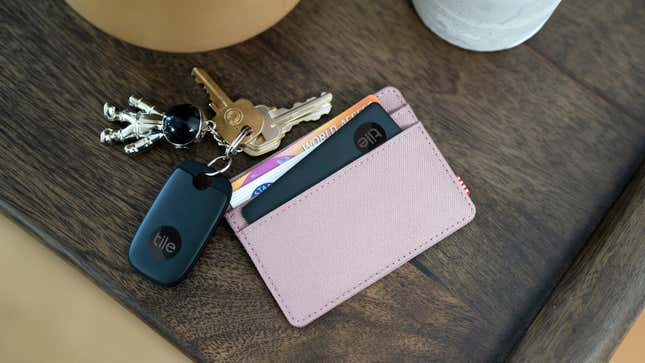These Women Were Stalked With AirTags. They Never Got Justice.
Stalking is nothing new, as one in three women will tell you, but law enforcement and Big Tech were unprepared to face the threat of tag and tile trackers.
In DepthIn Depth
Illustration: Benjamin Currie
Kimberly Scroop was leaving the gym after dark last September when she received an ominous notification: “AirTag Detected Near You.”
Scroop didn’t own an AirTag and yet, the alert specified the device had been traveling with her for hours as she’d gone about her day. Terrified at the thought of an unknown person following her every move, the 28-year-old hair stylist sped from the gym to her family’s home and immediately informed her step-father. He didn’t know what an AirTag was. Scroop searched her car, her bags, and even her shoes, to no avail. The next morning, she went to the police station, expecting officers to file a report. They didn’t. In fact, even after listening to Scroop’s account—wherein she again had to describe what an AirTag was—they didn’t so much as take her name or phone number.
“They basically told me what was happening wasn’t illegal so they weren’t going to take a report or anything,” Scroop told Jezebel. “It was like, if you don’t know who it is and we don’t know who it is, how do you expect us to find out? I was like, ‘You’re the cops.’”
If someone was following Scroop, they already knew more about her than the police did.
People are using AirTag and Tile trackers in dangerous ways.
The Bluetooth-enabled, quarter-sized, $29 AirTag, which attaches to a personal item like a wallet or pair of keys, was Apple’s iteration of the $25 Tile tracker, released years earlier. Both the Tile and the AirTag—not to mention an abundance of less popular competitors—were made with the same goal in mind: to prevent users from losing items they most valued, and to help them locate lost items faster when they inevitably did. However, it’s the latter product that was lauded (mostly by Apple) as ingenious at its April 2021 launch due to its greater location accuracy and the ubiquity of the iPhone with which it so easily pairs. For the millions who own an iPhone 11 or newer, a function called Precision Finding in the Find My app lets them track the AirTag down to the foot, with arrows on the screen quite literally guiding an owner to their device. Apple doesn’t boast, “Lose your knack for losing things,” for no reason.
Advocates for ethical tech and women’s safety sounded the alarm early on, but it wasn’t until January of this year, when Sports Illustrated model Brooks Nader revealed she was tracked by an AirTag, that anyone actually listened. After leaving a bar in New York City, Nadar said she received an unsettling alert from her iPhone: An “unknown accessory” had been detected on her person and was following her, triggering Apple’s abuse prevention system. (This system alerts iPhone users when an unknown AirTag has been detected nearby, sometimes hours after the fact. Apple released an app for Android users that allows them to manually, but not automatically, scan for trackers in December.) Nader said she suspected the device had been slipped into her coat pocket while she was sitting in a crowded restaurant earlier that evening.

The story sparked scores of terrifying TikToks and Twitter threads from young girls and women who said they’d also been victims of tracking with the aid of AirTags or similar technology. Months prior to Nader’s case, Scroop had sought refuge on the platform, sharing her experience of being tracked and her failed attempt at involving the police; the video has since been viewed over 5.5 million times. A month after Nader’s case went public, Apple issued a statement promising it would work alongside law enforcement upon request, and release additional software updates to better alert people when they’re being tracked. “Based on our knowledge and on discussions with law enforcement, incidents of AirTag misuse are rare; however, each instance is one too many,” the release read.
Given the number of unsettling reports emerging across the nation—from New York to Michigan to California to Ohio—there’s overwhelming evidence that these small devices are having an outsized impact, especially on the safety of women. And though it shouldn’t have surprised anyone that AirTags and the like would be used for nefarious purposes, reform on the part of both law enforcement and Big Tech remains disturbingly hard to find.
-

-

-

-

-

-

-

-

-

-

-

-

-

-

-

-

-

-

-

-

-

-

-

-

-

-

-

-

-

-

-

-

-

-

-

-

-

-

-

-









































